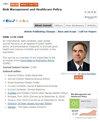在公共卫生方法中建立信任:危机应对中 "以人为本 "理念的重要性
IF 2.7
4区 医学
Q2 HEALTH CARE SCIENCES & SERVICES
引用次数: 0
摘要
目的:面对国际卫生治理中的政治模糊性,主张将建立信任作为应对公共卫生危机的关键解决方案:这篇透视文章回顾了基本概念,并利用开放获取来源的二手数据讨论了未来的方向:从 Covid-19 和以往的公共卫生危机中汲取经验教训的前景,以及对 "全民健康政策 "方法的日益认可,与未来紧急危机中各自为政的准备、管理和恢复计划相冲突。信任是克服这些局限性的可行解决方案。信任是一种凝聚力,它将社区内的个人团结在一起,培养归属感和参与感。建立信任被视为危机应对中的一种 "以人为本 "的方法,旨在创建积极和有复原力的社区,以促进准备和就绪、应对突发风险、促进恢复和减轻风险。剩下的一个问题是如何衡量和确定特定情况下信任的维度和决定因素。本文系统阐述了建立对公共卫生方法信任的途径,包括透明度、教育、健全和公平的卫生系统、加强社会资本、利益相关者的参与以及卫生工作者的培训:通过持续提供优质医疗服务、明确的共同愿景以及以道德标准为基础的价值观,可以促进对公共卫生方法的信任。这需要对包括工作人员在内的利益相关者的福祉做出承诺,并将可靠性、完整性和透明度融入政策、战略和实践中。模范的领导能力、资源利用的公开性、解决浪费或腐败问题以及对这些原则的有效沟通都是至关重要的。本文章由计算机程序翻译,如有差异,请以英文原文为准。
Trust Building in Public Health Approaches: The Importance of a “People-Centered” Concept in Crisis Response
Purpose: To argue for trust-building as a key solution for responding to public health crises in the face of political ambiguity in international health governance.
Patients and Methods: This perspective piece reviews fundamental concepts and discusses future directions using secondary data from open-access sources.
Results: The promise of learning from Covid-19 and previous public health crises, along with the growing recognition of a ‘Health For All Policies’ approach, clash with siloed preparations, management, and recovery plans for future emergency crises. Trust is proposed as a possible solution to overcome these limitations. It acts as a binding force that unites individuals within the community, fostering a sense of belonging and participation. Trust-building is viewed as a “People-Centered” approach in Crisis Response, aimed at creating active and resilient communities to foster preparation and readiness, respond to emergent risks, facilitate recovery, and mitigate risks. A remaining question is how to measure and identify the dimensions and determinants of trust in specific circumstances. Some ideas are systematized to highlight the pathway to build trust in public health approaches, including transparency, education, robust and equitable health systems, strengthened social capital, stakeholders’ engagement, and health workforce training.
Conclusion: Trust in public health approaches can be fostered through consistent delivery of quality care, a clear, shared vision, and values underpinned by ethical standards. It requires a commitment to stakeholder well-being, including staff, and the integration of reliability, integrity, and transparency into policies, strategies, and practices. Exemplary leadership, openness in resource utilization, addressing waste or corruption, and effective communication of these principles are essential.
Keywords: syndemics, community-led actions, trust building, public health emergencies
Patients and Methods: This perspective piece reviews fundamental concepts and discusses future directions using secondary data from open-access sources.
Results: The promise of learning from Covid-19 and previous public health crises, along with the growing recognition of a ‘Health For All Policies’ approach, clash with siloed preparations, management, and recovery plans for future emergency crises. Trust is proposed as a possible solution to overcome these limitations. It acts as a binding force that unites individuals within the community, fostering a sense of belonging and participation. Trust-building is viewed as a “People-Centered” approach in Crisis Response, aimed at creating active and resilient communities to foster preparation and readiness, respond to emergent risks, facilitate recovery, and mitigate risks. A remaining question is how to measure and identify the dimensions and determinants of trust in specific circumstances. Some ideas are systematized to highlight the pathway to build trust in public health approaches, including transparency, education, robust and equitable health systems, strengthened social capital, stakeholders’ engagement, and health workforce training.
Conclusion: Trust in public health approaches can be fostered through consistent delivery of quality care, a clear, shared vision, and values underpinned by ethical standards. It requires a commitment to stakeholder well-being, including staff, and the integration of reliability, integrity, and transparency into policies, strategies, and practices. Exemplary leadership, openness in resource utilization, addressing waste or corruption, and effective communication of these principles are essential.
Keywords: syndemics, community-led actions, trust building, public health emergencies
求助全文
通过发布文献求助,成功后即可免费获取论文全文。
去求助
来源期刊

Risk Management and Healthcare Policy
Medicine-Public Health, Environmental and Occupational Health
CiteScore
6.20
自引率
2.90%
发文量
242
审稿时长
16 weeks
期刊介绍:
Risk Management and Healthcare Policy is an international, peer-reviewed, open access journal focusing on all aspects of public health, policy and preventative measures to promote good health and improve morbidity and mortality in the population. Specific topics covered in the journal include:
Public and community health
Policy and law
Preventative and predictive healthcare
Risk and hazard management
Epidemiology, detection and screening
Lifestyle and diet modification
Vaccination and disease transmission/modification programs
Health and safety and occupational health
Healthcare services provision
Health literacy and education
Advertising and promotion of health issues
Health economic evaluations and resource management
Risk Management and Healthcare Policy focuses on human interventional and observational research. The journal welcomes submitted papers covering original research, clinical and epidemiological studies, reviews and evaluations, guidelines, expert opinion and commentary, and extended reports. Case reports will only be considered if they make a valuable and original contribution to the literature. The journal does not accept study protocols, animal-based or cell line-based studies.
 求助内容:
求助内容: 应助结果提醒方式:
应助结果提醒方式:


